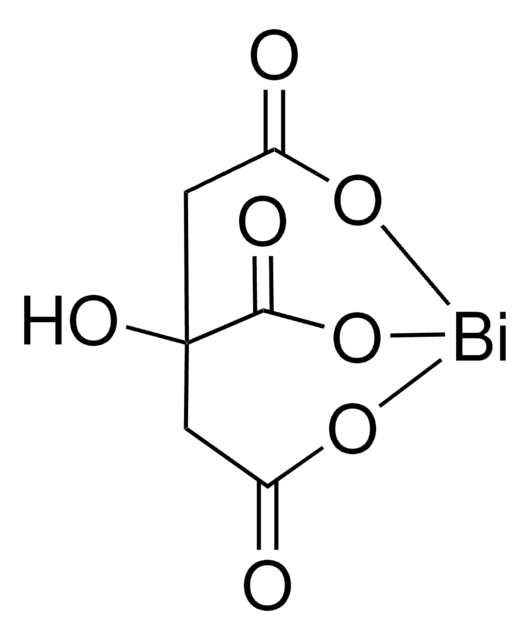544132
Bismuth neodecanoate
Synonyme(s) :
Bismuth trineodecanoate, Neodecanoic acid bismuth salt
About This Item
Produits recommandés
Forme
liquid
Pertinence de la réaction
core: bismuth
reagent type: catalyst
Indice de réfraction
n20/D 1.479 (lit.)
Point d'ébullition
300 °C (lit.)
Densité
1.145 g/mL at 25 °C (lit.)
Chaîne SMILES
CCCCCCC(C)(C)C(=O)O[Bi](OC(=O)C(C)(C)CCCCCC)OC(=O)C(C)(C)CCCCCC
InChI
1S/3C10H20O2.Bi/c3*1-4-5-6-7-8-10(2,3)9(11)12;/h3*4-8H2,1-3H3,(H,11,12);/q;;;+3/p-3
Clé InChI
TUQRJVHQQXIPMN-UHFFFAOYSA-K
Application
- Thermoplastic polyurethanes by reacting polycaprolactone diols, diisocyanates, and diols with anthracene group.
- Polysiloxanes from hydroxy-terminatedpoly(dimethylsiloxanes) and ethyl silicate.
Code de la classe de stockage
10 - Combustible liquids
Classe de danger pour l'eau (WGK)
WGK 1
Point d'éclair (°F)
Not applicable
Point d'éclair (°C)
Not applicable
Équipement de protection individuelle
Eyeshields, Gloves
Certificats d'analyse (COA)
Recherchez un Certificats d'analyse (COA) en saisissant le numéro de lot du produit. Les numéros de lot figurent sur l'étiquette du produit après les mots "Lot" ou "Batch".
Déjà en possession de ce produit ?
Retrouvez la documentation relative aux produits que vous avez récemment achetés dans la Bibliothèque de documents.
Les clients ont également consulté
Notre équipe de scientifiques dispose d'une expérience dans tous les secteurs de la recherche, notamment en sciences de la vie, science des matériaux, synthèse chimique, chromatographie, analyse et dans de nombreux autres domaines..
Contacter notre Service technique











